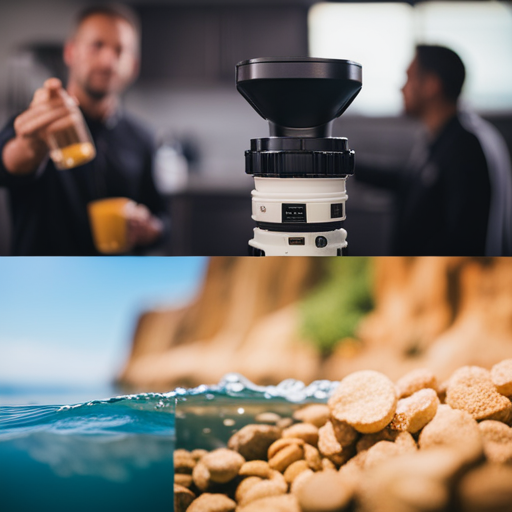Are you concerned about the fluoride content in your drinking water? While Brita is a popular and easily accessible water filter brand, it may not be the best option for removing fluoride.
In this fluoride filter review, we will compare Brita to other popular water filter brands to determine which ones effectively remove fluoride from drinking water.
As you explore the different types of filters available, it is important to understand the basics of how they work. Some filters use activated carbon to trap contaminants, while others use reverse osmosis technology to remove impurities.
It is also important to consider the lifespan of each filter and the cost of replacement cartridges. By understanding the different filter options and their capabilities, you can make an informed decision about which filter will best suit your needs and budget.
So, let’s dive into the fluoride filter review and find out which filters are the most effective at removing fluoride from your drinking water.
Key Takeaways
– Brita filters do not remove fluoride from drinking water.
– There are several other options for filters that effectively remove fluoride including Clearly Filtered, PUR, Big Berkey, Berkey Fluoride Reduction Filter, and Reverse Osmosis filters.
– Water distillers can also remove fluoride but may remove beneficial minerals as well.
– Testing water for fluoride can be done by labs for around $45 per sample and knowing what’s in your water can help you stay safe and healthy.
Filter Basics
You already know that fluoride is an important mineral in drinking water, but if you’re looking to remove it, you’ll need to consider different types of filters. For instance, Brita filters do not remove fluoride.
Filter technology plays a crucial role in removing fluoride from your drinking water. Reverse osmosis filters use a semi-permeable membrane to remove up to 94% of fluoride from water along with other contaminants such as lead, chromium, and arsenic. Water distillers, on the other hand, can remove 99+% of fluoride plus a long list of other contaminants from drinking water. However, they may also remove beneficial minerals from water, but you can add them back in with a mineral filter or manually.
Fluoride exposure is a major concern for many people, especially those with sensitive teeth or children who are more susceptible to developing fluorosis. Knowing what’s in your water and taking steps to reduce fluoride exposure can help you stay safe and healthy.
Different types of filters may be needed to effectively remove fluoride from drinking water, and it’s important to choose a filter that fits your needs and lifestyle. Whether you’re looking for a pitcher filter or a more comprehensive filtration system, there are many options available to help you reduce your fluoride exposure and enjoy clean, safe drinking water.
Effective Filters
Consider using a reverse osmosis filter or a water distiller to effectively remove contaminants from your drinking water. These two types of filters are known to be highly effective in removing fluoride, as well as other harmful contaminants such as lead, chromium, and arsenic.
Here is a comparison table of the top-rated reverse osmosis and water distiller filters that can remove fluoride from your drinking water:
| Filter Name | Capacity | Fluoride Removal Efficiency | Other Contaminants Removed |
|---|---|---|---|
| Express Water RO5DX Reverse Osmosis Filter | 50 gallons per day | >94% | Lead, arsenic, chromium, chlorine, bacteria, viruses |
| Big Berkey Gravity Water Filter with Fluoride Reduction | 1,000 gallons | Up to 97% | Lead, arsenic, mercury, chlorine, VOCs, PFAS |
| VIVOHOME Brushed 304 Stainless Steel Water Distiller | 4 liters per batch | 99+% | Lead, arsenic, mercury, chlorine, VOCs, PFAS |
Choosing the right filter for your home depends on your specific needs and budget. Consider the capacity of the filter, the efficiency of fluoride removal, and the other contaminants removed when making your decision. With the right filter, you can enjoy clean and safe drinking water free of harmful contaminants.
Testing and Certifications
To ensure the safety of your drinking water, it’s important to look for certifications from organizations like NSF International when selecting a filter. NSF certification means the filter has been independently tested and verified to meet certain standards for contaminant reduction, including fluoride.
The certification process involves rigorous testing to ensure the filter can effectively remove contaminants from water without introducing new ones.
In addition to certifications, lab testing can also be a helpful tool in determining the effectiveness of a filter. Labs can test water samples for specific contaminants, including fluoride, and provide detailed reports on the levels of each contaminant present.
This information can help you choose the right filter for your needs and ensure that your drinking water is safe and healthy. By choosing a filter with NSF certification and utilizing lab testing, you can have peace of mind knowing that your drinking water is free from harmful contaminants like fluoride.
Conclusion
So, if you’re looking for a fluoride filter for your home, Brita may not be the best option. However, there are many other brands and types of filters available that can effectively remove fluoride and provide safe drinking water.
It’s important to do your research and choose a filter that meets your specific needs and preferences. Remember to also test your water regularly to ensure you’re aware of any potential contaminants.
Look for filters that have been certified by reputable organizations, such as NSF International, to ensure they meet industry standards for water filtration. With the right filter and testing routine, you can enjoy clean and safe drinking water in your home.




